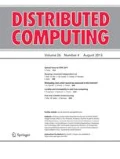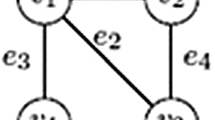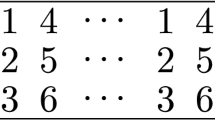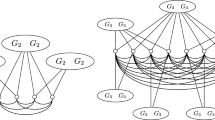Abstract
The Lovász local lemma (LLL), introduced by Erdős and Lovász in 1975, is a powerful tool of the probabilistic method that allows one to prove that a set of n “bad” events do not happen with non-zero probability, provided that the events have limited dependence. However, the LLL itself does not suggest how to find a point avoiding all bad events. Since the works of Alon (Random Struct Algorithms 2(4):367–378, 1991) and Beck (Random Struct Algorithms 2(4):343–365, 1991) there has been a sustained effort to find a constructive proof (i.e. an algorithm) for the LLL or weaker versions of it. In a major breakthrough Moser and Tardos (J ACM 57(2):11, 2010) showed that a point avoiding all bad events can be found efficiently. They also proposed a distributed/parallel version of their algorithm that requires \(O(\log ^2 n)\) rounds of communication in a distributed network. In this paper we provide two new distributed algorithms for the LLL that improve on both the efficiency and simplicity of the Moser–Tardos algorithm. For clarity we express our results in terms of the symmetric LLL though both algorithms deal with the asymmetric version as well. Let p bound the probability of any bad event and d be the maximum degree in the dependency graph of the bad events. When \(epd^2 < 1\) we give a truly simple LLL algorithm running in \(O(\log _{1/epd^2} n)\) rounds. Under the weaker condition \(ep(d+1) < 1\), we give a slightly slower algorithm running in \(O(\log ^2 d\cdot \log _{1/ep(d+1)} n)\) rounds. Furthermore, we give an algorithm that runs in sublogarithmic rounds under the condition \(p\cdot f(d) < 1\), where f(d) is an exponential function of d. Although the conditions of the LLL are locally verifiable, we prove that any distributed LLL algorithm requires \({\varOmega }(\log ^* n)\) rounds. In many graph coloring problems the existence of a valid coloring is established by one or more applications of the LLL. Using our LLL algorithms, we give logarithmic-time distributed algorithms for frugal coloring, defective coloring, coloring girth-4 (triangle-free) and girth-5 graphs, edge coloring, and list coloring.


Similar content being viewed by others
Notes
Note that \(\log _{1/ep(d+1)} n\) could be sublogarithmic or superlogarithmic depending on how close \(ep(d+1)\) is to 0 or 1.
These MIS algorithms are significantly more complex than Luby’s and use larger messages.
Suppose H is both the distributed network and the graph to be colored. When invoking the LLL, the dependency graph \(G_{\mathcal {A}}\) is not identical to H. Typically bad events in \(\mathcal {A}\) are associated with H-vertices and two bad events are adjacent in \(G_{\mathcal {A}}\) only if the corresponding vertices are at distance O(1) in H. Thus, a distributed LLL algorithm for \(G_{\mathcal {A}}\) can be simulated in H with an O(1) slowdown.
We slightly abuse the notation that when conditioning on the random variable \(X_i\), it means \(X_i\) may take arbitrary values, whereas when conditioning on the event \(\mathcal {E}_i\), it means that \(\mathcal {E}_i\) happens.
References
Alon, N.: A parallel algorithmic version of the local lemma. Random Struct. Algorithms 2(4), 367–378 (1991)
Alon, N., Babai, L., Itai, A.: A fast and simple randomized parallel algorithm for the maximal independent set problem. J. Algorithms 7(4), 567–583 (1986)
Alon, N., Krivelevich, M., Sudakov, B.: Coloring graphs with sparse neighborhoods. J. Comb. Theory Ser. B 77(1), 73–82 (1999)
Barenboim, L., Elkin, M.: Distributed Graph Coloring: Fundamentals and Recent Developments Synthesis Lectures on Distributed Computing Theory. Morgan & Claypool, San Rafael (2013)
Barenboim, L., Elkin, M., Kuhn, F.: Distributed \({({\varDelta }+1)}\)-coloring in linear (in \({\varDelta }\)) time. SIAM J. Comput. 43(1), 72–95 (2014)
Barenboim, L., Elkin, M., Pettie, S., Schneider, J.: The locality of distributed symmetry breaking. J. ACM 63(3), 1–20 (2016)
Beck, J.: An algorithmic approach to the Lovász local lemma. I. Random Struct. Algorithms 2(4), 343–365 (1991)
Brandt, S., Fischer, O., Hirvonen, J., Keller, B., Lempiäinen, T., Rybicki, J., Suomela, J., Uitto, J.: A lower bound for the distributed lovász local lemma. In: Proceedings of 48th ACM Symposium on Theory of Computing (STOC), pp. 479–488 (2016)
Chandrasekaran, K., Goyal, N., Haeupler, B.: Deterministic algorithms for the Lovász local lemma. SIAM J. Comput. 42(6), 2132–2155 (2013)
Chang, Y., Kopelowitz, T., Pettie, S.: An exponential separation between randomized and deterministic complexity in the LOCAL model. In: Proceedings of 57th Symposium on Foundations of Computer Science (FOCS), pp. 195–197 (2016)
Czumaj, A., Scheideler, C.: A new algorithm approach to the general Lovász local lemma with applications to scheduling and satisfiability problems (extended abstract). In: Proceedings of 32nd ACM Symposium on Theory of Computing (STOC), pp. 38–47 (2000)
Dubhashi, D., Grable, D.A., Panconesi, A.: Near-optimal, distributed edge colouring via the nibble method. Theor. Comput. Sci. 203(2), 225–251 (1998)
Elkin, M., Pettie, S., Su, H.-H.: (\(2{\varDelta }-1\))-edge-coloring is much easier than maximal matching in the distributed setting. In: Proceedings of 26th ACM-SIAM Symposium on Discrete Algorithms (SODA), pp. 355–370 (2015)
Erdős, P., Lovász, L.: Problems and results on 3-chromatic hypergraphs and some related questions. In: Hanjal, A., Rado, R., Sós, V.T. (eds.) Infinite and Finite Sets, vol. 11, pp. 609–627. North-Holland, Amsterdam (1975)
Ghaffari, M.: An improved distributed algorithm for maximal independent set. In: Proceedings of 27th ACM-SIAM Symposium on Discrete Algorithms (SODA), pp. 270–277 (2016)
Haeupler, B., Saha, B., Srinivasan, A.: New constructive aspects of the Lovász local lemma. J. ACM 58(6), 28 (2011)
Harris, D.G.: Lopsidependency in the Moser–Tardos framework: beyond the lopsided Lovász local lemma. In: Proceedings of 26th ACM-SIAM Symposium on Discrete Algorithms (SODA), pp. 1792–1808 (2015)
Harris, D.G., Srinivasan, A.: The Moser-Tardos framework with partial resampling. In: Proceedings of 54th IEEE Symposium on Foundations of Computer Science (FOCS), pp. 469–478 (2013)
Harris, D.G., Srinivasan, A.: A constructive algorithm for the Lovász local lemma on permutations. In: Proceedings of 25th ACM-SIAM Symposium on Discrete Algorithms (SODA) pp. 907–925 (2014)
Haxell, P.E.: A note on vertex list colouring. Comb. Probab. Comput. 10(4), 345–347 (2001)
Hind, H., Molloy, M., Reed, B.: Colouring a graph frugally. Combinatorica 17(4), 469–482 (1997)
Kolipaka, K., Szegedy, M.: Moser and Tardos meet Lovász. In: Proceedings 43rd ACM Symposium on Theory of Computing (STOC), pp. 235–244 (2011)
Kuhn, F., Moscibroda, T., Wattenhofer, R.: Local computation: lower and upper bounds. J. ACM 63(2), 17 (2016)
Kuhn, F., Wattenhofer, R.: On the complexity of distributed graph coloring. In: Proceedings 25th Annual ACM Symposium on Principles of Distributed Computing (PODC), pp. 7–15 (2006)
Levi, R., Rubinfeld, R., Yodpinyanee, A.: Local computation algorithms for graphs of non-constant degrees. Algorithmica, pp. 1–24 (2016)
Linial, N.: Locality in distributed graph algorithms. SIAM J. Comput. 21(1), 193–201 (1992)
Luby, M.: A simple parallel algorithm for the maximal independent set problem. SIAM J. Comput. 15(4), 1036–1053 (1986)
Molloy, M., Reed, B.: Further algorithmic aspects of the local lemma. In: Proceedings of 30th ACM Symposium on Theory of Computing (STOC), pp. 524–529 (1998)
Molloy, M., Reed, B.: Graph Colouring and the Probabilistic Method. Algorithms and Combinatorics. Springer, Berlin (2001)
Molloy, M., Reed, B.: Asymptotically optimal frugal colouring. J. Comb. Theory Ser. B 100(2), 226–246 (2010)
Moser, R.A.: Derandomizing the Lovász local lemma more effectively. CoRR, abs/0807.2120 (2008)
Moser, R.A.: A constructive proof of the Lovász local lemma. In: Proceedings of 41st ACM Symposium on Theory of Computing (STOC), pp. 343–350 (2009)
Moser, R.A., Tardos, G.: A constructive proof of the general Lovász local lemma. J. ACM 57(2), 11 (2010)
Pegden, W.: An extension of the Moser–Tardos algorithmic local lemma. SIAM J. Discrete Math. 28(2), 911–917 (2014)
Peleg, D.: Distributed Computing: A Locality-Sensitive Approach. Monographs on Discrete Mathematics and Applications. Society for Industrial and Applied Mathematics, Philadelphia (2000)
Pemmaraju, S., Srinivasan, A.: The randomized coloring procedure with symmetry-breaking. In: Proceedings of 35th Int’l Colloq. on Automata, Languages, and Programming (ICALP), pp. 306–319 (2008)
Pettie, S., Su, H.-H.: Fast distributed coloring algorithms for triangle-free graphs. In: Proceedings of 40th Int’l Colloq. on Automata, Languages, and Programming (ICALP), pp. 687–699, (2013)
Reed, B.: The list colouring constants. J. Graph Theory 31(2), 149–153 (1999)
Reed, B., Sudakov, B.: Asymptotically the list colouring constants are 1. J. Comb. Theory Ser. B 86(1), 27–37 (2002)
Schneider, J., Wattenhofer, R.: A new technique for distributed symmetry breaking. In: Proceedings of 29th ACM Symposium on Principles of Distributed Computing (PODC), pp. 257–266 (2010)
Spencer, J.: Asymptotic lower bounds for Ramsey functions. Discret. Math. 20, 69–76 (1977)
Srinivasan, A.: Improved algorithmic versions of the Lovász local lemma. In: Proceedings of 19th ACM-SIAM Symposium on Discrete Algorithms (SODA), pp. 611–620 (2008)
Acknowledgements
Thanks Mohsen Ghaffari for pointing out that by iteratively applying LLL, the range of f can be improved from \({\varOmega }(\log {\varDelta })\) to any positive integer for f-defective, \(O({\varDelta }/f)\)-colorings.
Author information
Authors and Affiliations
Corresponding author
Additional information
A preliminary version of this paper appeared in the 33rd Proceedings of the ACM Symposium on Principles of Distributed Computing (PODC). Pettie and Su are supported by NSF Grants CCF-0746673, CCF-1217338, CNS-1318294, CCF-1514383, and a grant from the US-Israel Binational Science Foundation. Part of the work was done while visiting MADALGO at Aarhus University, supported by Danish National Research Foundation Grant DNRF84. Chung was supported by NSF Grants CNS-1217821, CCF-1214844, and R. Pass’s Sloan Fellowship.
Appendix: Tools
Appendix: Tools
Lemma 18
(Chernoff Bound) Let \(X_1,\dots , X_n\) be indicator variables such that \(\Pr (X_i=1) = p\). Let \(X = \sum _{i=1}^{n} X_i\). Then, for \(\delta > 0\):
The two bounds above imply that for \(0< \delta < 1\), we have:
Lemma 19
Let \(\mathcal {E}_1, \ldots , \mathcal {E}_n\) be (likely) events and \(X_1, \ldots , X_n\) be indicator variables such that for each \(1 \le i \le n\) and \(X = \sum _{i=1}^{n} X_i\),
where \(\varvec{X}_i\) denotes the shorthand for \((X_1,\ldots ,X_i)\).Footnote 4 Then for \(\delta > 0\):
and thus by the union bound,
Proof
For now let us treat \(\mathcal {E}_i\) as 0/1 random variables and let \(\mathcal {E} = \prod _i \mathcal {E}_i\). For any \(t>0\),
We will show by induction that
When \(k = 0\), it is trivial that \({\text {E}}[\mathcal {E}] \le 1\).
Therefore, by (6),
The last equality follows from the standard derivation of Chernoff Bound by choosing \(t = \ln (1+\delta )\). \(\square \)
Corollary 5
Suppose that for any \(\delta > 0\),
then for any \(M \ge np\) and \(0< \delta < 1\),
Proof
Without loss of generality, assume \(M = tnp\) for some \(t \ge 1\), we have
Inequality (*) follows if \((1+t \delta )^{(1+t \delta )/t} \ge (1+\delta )^{(1+\delta )}\), or equivalently, \(((1+t \delta )/t) \ln (1+t \delta ) \ge (1+\delta ) \ln (1+\delta )\). Letting \(f(t) = ((1+t \delta )/t )\ln (1+t \delta ) - (1+\delta ) \ln (1+\delta )\), we have \(f'(t) = \frac{1}{t^2}\left( \delta t - \ln (1+\delta t) \right) \ge 0\) for \(t > 0\). Since \(f(1) = 0\) and \(f'(t) \ge 0\) for \(t > 0\), we must have \(f(t) \ge 0\) for \(t\ge 1\). \(\square \)
Rights and permissions
About this article
Cite this article
Chung, KM., Pettie, S. & Su, HH. Distributed algorithms for the Lovász local lemma and graph coloring. Distrib. Comput. 30, 261–280 (2017). https://doi.org/10.1007/s00446-016-0287-6
Received:
Accepted:
Published:
Issue Date:
DOI: https://doi.org/10.1007/s00446-016-0287-6




